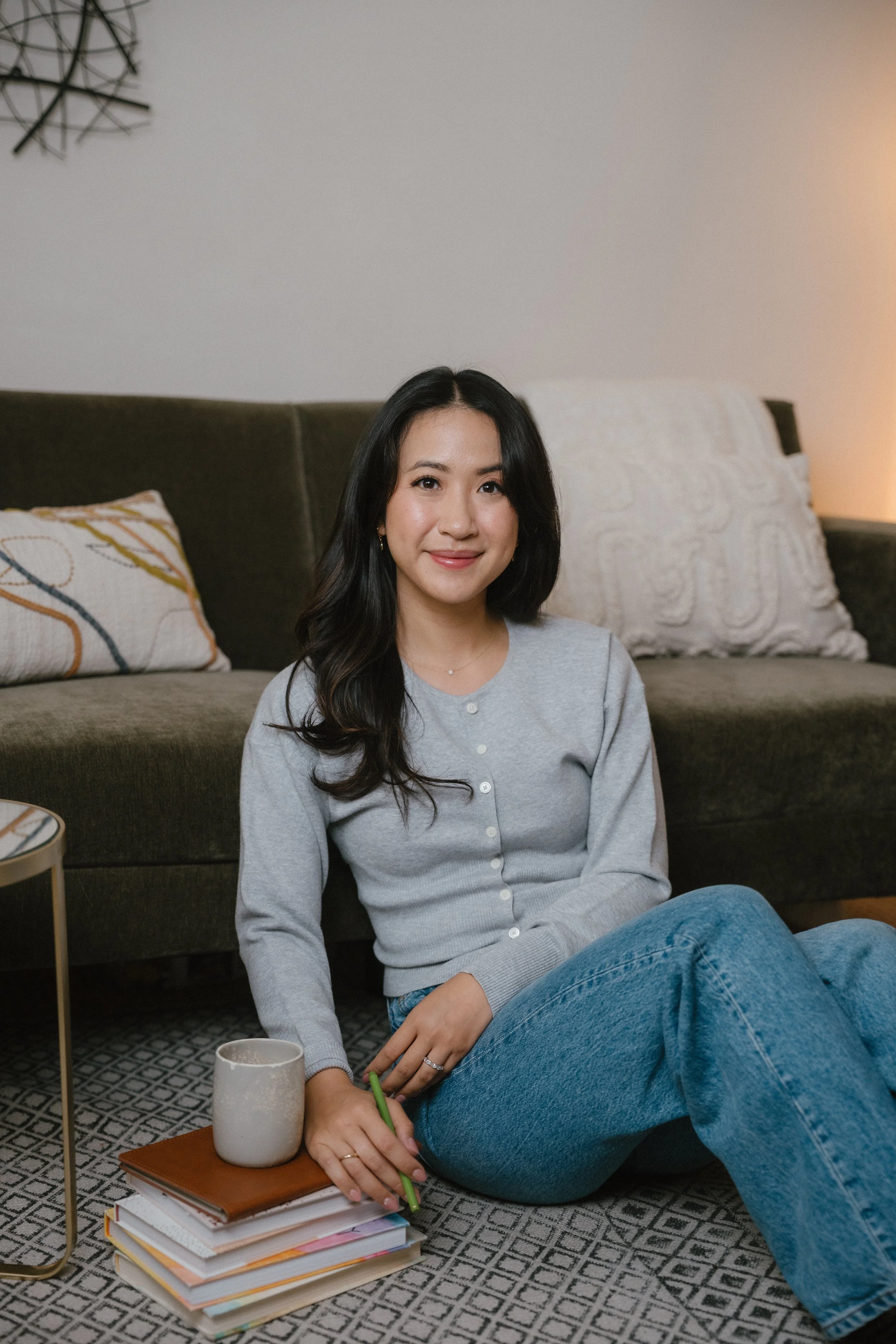

















Hi there, this is my story.
You’re probably wondering… why or how I got into the field. Who is Michelle anyway?
I am an Asian American, a first-generation college graduate, a social worker who cares deeply about social justice, a mental health advocate, an Asian American mental health de-stigmatizer, and a culturally competent and sensitive therapist. I am an anti-racist clinician and aim to be culturally responsive in the way I provide treatment and how I live my life.
Outside of my professional work, I am the youngest daughter of Vietnamese immigrants, a sister, partner, friend, a bad but joyful dancer, and a dog owner.
I grew up in the Bay Area, a culturally diverse melting pot where things naturally felt like home. My middle and high school classmates were all in the same boat; our parents are Vietnamese working-class immigrants, and as offspring, we can “lead better lives.” Being around those who understood our cultural and family backgrounds was comfortable. As we navigated the “American Dream” and the underlying pressures of the Model Minority Myth, we recognized the privilege of higher education and future stability.
Through conversations with peers, I noticed similar patterns of difficulties. We faced guilt and pressure, a lot of it. New opportunities trigger feelings of pressure, responsibility, and lived experiences only relevant to first-generation children. We struggled with self-care and rest because we learned of our parents’ hard work and grit.
There was a looming pressure of “giving back” and how to navigate boundaries and identity changes as we grew closer to ourselves and further from the generations before us. As new life experiences continued, emotional distance and relationships with familial or cultural values changed. Communication and understanding were hard to bridge. Despite these nuances, we support our families while navigating an unpaved life.
Therapists are human, too. Actually, let me start over, therapists are human... first.
In my emerging adulthood, I experienced challenges of personal health complications, caregiving for my ill and disabled mother, and acculturating to my personal identity versus my parent’s immigrant background and traditions. I was given the opportunity away from home when I first entered college and this is where I first-handedly experienced imposter syndrome. This only intensified when I moved to graduate school. Being a minority in higher educational settings, training to be a healthcare professional at a young age, feeling misunderstood, unseen, and underrepresented, in addition to living in the Midwest with different cultures weighed heavily on my mind. I constantly felt as though I stood out and never felt at home. With vulnerability and seeing my first therapist, I came to the awareness that these are common experiences as BIPOC individuals maneuver their individual journeys to lead diverse generational milestones.
Throughout my personal experiences, I made it my life’s work to continue to learn from others as well as support people in their curated mentally resilient communities, organizations, and to support my clients in understanding themselves and their wellness journeys.
In my personal therapy experiences, I understand the importance of a nonjudgmental, curious, and safe space. I greatly benefited from receiving guidance from an objective mental health professional who took the time to understand, validate, and guide me. But something was missing… my therapist was not Asian. Some clinical interventions, coping skills, labels, or the shock of learning family traditions and norms made me feel misunderstood and, at times, even ashamed of my cultural background. Being able to relate to your therapist is one of the key ways to build rapport and I am proud of be a representative for my Asian American and first-generation clients.
As a therapist and social work professional, I learn with and from my clients. Wherever you may be, I consider our therapeutic relationship sacred and hold it with gentle care. I intend to meet you on your current path toward your journey, with great humility, compassion, and an open mind. I invite my clients to correct me and hold me accountable, as I practice curiosity and how to show up as a safe person in your life.
Education & Experience.
I have experience working in nonprofit mental health acute residential settings and major hospital organizations in Michigan & California. I’ve worked with adults with acute mental health illnesses in Partial Hospital and Intensive Outpatient Program settings. In addition, I’ve served clients through Solution Focused Therapy for depression and anxiety, pregnancy, and postpartum mood symptoms in an OBGYN clinic, and provided Behavioral Health Consultations for medical doctors and nurse practitioners in primary care settings.
In my professional years, I developed a proficient background in evidence-based treatment interventions, including Cognitive Behavioral Therapy, Dialectical Behavioral Therapy, Acceptance and Commitment Therapy, Mindfulness, and Self-Compassion.
The University of California, Santa Cruz | Bachelor's in Psychology
The University of Michigan, Ann Arbor School of Social Work | Master of Social Work
Michigan Medicine Hospital & Department of Psychiatry | Social Work Field Placement
Kaiser Permanente Department of Psychiatry Fellow | Master’s Fellowship Placement and Training
Kaiser Permanente Department of Psychiatry & Behavioral Medicine | Women’s Clinic / OBGYN Specialist
El Camino Health Mental Health & Addiction Services | Partial Hospitalization & Intensive Outpatient Program
Lyra Health at Google | Onsite Therapist
Postpartum Support International Training
Components of Care: Perinatal Mood and Anxiety Disorders 2021
Perinatal Mental Health Advanced Psychotherapy Training 2022



